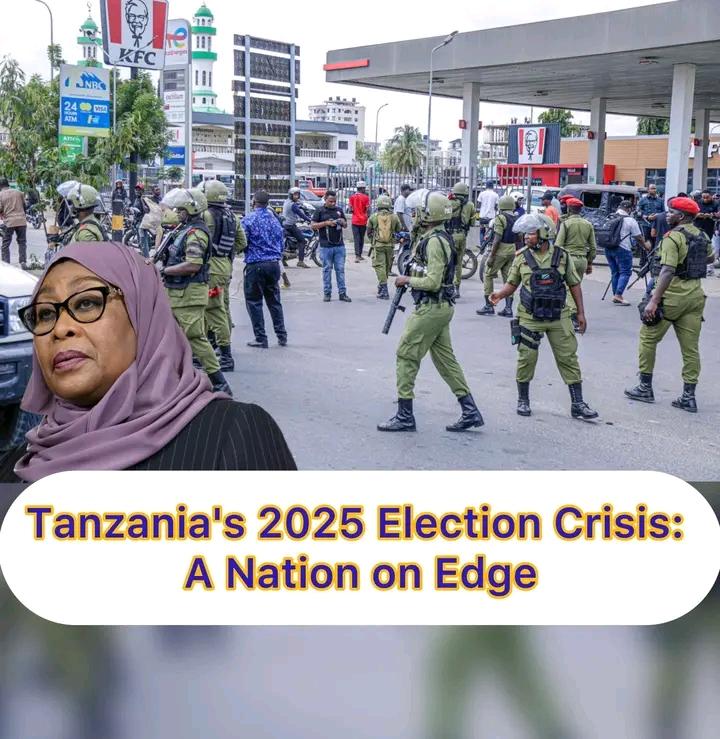Tanzania's 2025 Election Crisis: A Nation on Edge
The storyline pieced together from global news, online news outlets, and social media reveals an alarming descent into authoritarianism in Tanzania. A country long hailed as a beacon of East African stability under leaders like Julius Nyerere, is now grappling with its most contested election in decades.
A "Stolen" Election Engineered for One Winner
Tanzania's general elections on October 29 were never meant to be competitive. President Samia Suluhu Hassan, who assumed power in 2021 after John Magufuli's death, faced 16 challengers—but none of substance. Her two main opponents from the opposition Chadema party, including popular figures like Tundu Lissu, were disqualified on technicalities or jailed on charges critics call fabricated, such as "inciting violence" or "treason." Human rights groups like Amnesty International and the UN had warned for months of an "unprecedented crackdown," with over 200 enforced disappearances of activists, journalists, and critics since 2019.
Provisional results, announced amid the chaos by the National Electoral Commission (NEC), show Hassan securing a landslide 85.4% victory for her Chama Cha Mapinduzi (CCM) party—results opposition leaders dismissed as rigged from the start. Protests erupted immediately in Dar es Salaam, Arusha, and Mwanza, with demonstrators burning tires, storming polling stations, and shredding ballots. "This isn't an election; it's a coronation," one Chadema supporter told Reuters.
Police fired tear gas, rubber bullets, and live ammunition to disperse crowds, injuring dozens and killing an unconfirmed number. Opposition sources claim "hundreds" dead nationwide, including youth protesters shot at close range; the government admits only to "pockets of violence" and vandalism against public property, denying excessive force. Eyewitness videos on X show burning buildings, overturned vehicles, and clashes with riot-geared officers—scenes reminiscent of Kenya's 2024 Gen-Z uprising but on a fiercer scale.
NetBlocks confirmed a nationwide shutdown starting election day, throttling access to 90% of the internet to curb live-streamed evidence. Local media like Wasafi FM and ITV have gone dark on coverage, fearing reprisals, while foreign journalists like CNN's Larry Madowo report visa denials. A dusk-to-dawn curfew was imposed in Dar es Salaam, with the army warning police against lethal force but patrolling streets in armored vehicles. Borders with Kenya (at Namanga) and Uganda saw spillover skirmishes, injuring two Kenyan traders. This echoes tactics in Sudan and Myanmar, per digital rights experts.
Online, the sentiment is raw: Tanzanians are unfollowing pro-Hassan celebrities like Diamond Platnumz (whose businesses were torched), with hashtags like #SuluhuMustGo trending despite the blackout. One viral post calls it "Idi Amin Mama," blending fury with dark humor. Another laments, "Tanzania will not be the same after this... Samia won't preside over an unhappy nation." The whereabouts of President Hassan remains unknown amid the Storm as many news reports, like that of Kenyan ‘The Standard’ claims. Army Chief Gen. Jacob Mkunda labeled protesters "criminals" on October 30, signaling her grip remains firm. Still, her silence during the peak violence has fueled speculation of a bunker-like retreat, amplifying the "darkness" narrative.
The storyline pieced together from global news, online news outlets, and social media reveals an alarming descent into authoritarianism in Tanzania. A country long hailed as a beacon of East African stability under leaders like Julius Nyerere, is now grappling with its most contested election in decades.
A "Stolen" Election Engineered for One Winner
Tanzania's general elections on October 29 were never meant to be competitive. President Samia Suluhu Hassan, who assumed power in 2021 after John Magufuli's death, faced 16 challengers—but none of substance. Her two main opponents from the opposition Chadema party, including popular figures like Tundu Lissu, were disqualified on technicalities or jailed on charges critics call fabricated, such as "inciting violence" or "treason." Human rights groups like Amnesty International and the UN had warned for months of an "unprecedented crackdown," with over 200 enforced disappearances of activists, journalists, and critics since 2019.
Provisional results, announced amid the chaos by the National Electoral Commission (NEC), show Hassan securing a landslide 85.4% victory for her Chama Cha Mapinduzi (CCM) party—results opposition leaders dismissed as rigged from the start. Protests erupted immediately in Dar es Salaam, Arusha, and Mwanza, with demonstrators burning tires, storming polling stations, and shredding ballots. "This isn't an election; it's a coronation," one Chadema supporter told Reuters.
Police fired tear gas, rubber bullets, and live ammunition to disperse crowds, injuring dozens and killing an unconfirmed number. Opposition sources claim "hundreds" dead nationwide, including youth protesters shot at close range; the government admits only to "pockets of violence" and vandalism against public property, denying excessive force. Eyewitness videos on X show burning buildings, overturned vehicles, and clashes with riot-geared officers—scenes reminiscent of Kenya's 2024 Gen-Z uprising but on a fiercer scale.
NetBlocks confirmed a nationwide shutdown starting election day, throttling access to 90% of the internet to curb live-streamed evidence. Local media like Wasafi FM and ITV have gone dark on coverage, fearing reprisals, while foreign journalists like CNN's Larry Madowo report visa denials. A dusk-to-dawn curfew was imposed in Dar es Salaam, with the army warning police against lethal force but patrolling streets in armored vehicles. Borders with Kenya (at Namanga) and Uganda saw spillover skirmishes, injuring two Kenyan traders. This echoes tactics in Sudan and Myanmar, per digital rights experts.
Online, the sentiment is raw: Tanzanians are unfollowing pro-Hassan celebrities like Diamond Platnumz (whose businesses were torched), with hashtags like #SuluhuMustGo trending despite the blackout. One viral post calls it "Idi Amin Mama," blending fury with dark humor. Another laments, "Tanzania will not be the same after this... Samia won't preside over an unhappy nation." The whereabouts of President Hassan remains unknown amid the Storm as many news reports, like that of Kenyan ‘The Standard’ claims. Army Chief Gen. Jacob Mkunda labeled protesters "criminals" on October 30, signaling her grip remains firm. Still, her silence during the peak violence has fueled speculation of a bunker-like retreat, amplifying the "darkness" narrative.
Tanzania's 2025 Election Crisis: A Nation on Edge
The storyline pieced together from global news, online news outlets, and social media reveals an alarming descent into authoritarianism in Tanzania. A country long hailed as a beacon of East African stability under leaders like Julius Nyerere, is now grappling with its most contested election in decades.
A "Stolen" Election Engineered for One Winner
Tanzania's general elections on October 29 were never meant to be competitive. President Samia Suluhu Hassan, who assumed power in 2021 after John Magufuli's death, faced 16 challengers—but none of substance. Her two main opponents from the opposition Chadema party, including popular figures like Tundu Lissu, were disqualified on technicalities or jailed on charges critics call fabricated, such as "inciting violence" or "treason." Human rights groups like Amnesty International and the UN had warned for months of an "unprecedented crackdown," with over 200 enforced disappearances of activists, journalists, and critics since 2019.
Provisional results, announced amid the chaos by the National Electoral Commission (NEC), show Hassan securing a landslide 85.4% victory for her Chama Cha Mapinduzi (CCM) party—results opposition leaders dismissed as rigged from the start. Protests erupted immediately in Dar es Salaam, Arusha, and Mwanza, with demonstrators burning tires, storming polling stations, and shredding ballots. "This isn't an election; it's a coronation," one Chadema supporter told Reuters.
Police fired tear gas, rubber bullets, and live ammunition to disperse crowds, injuring dozens and killing an unconfirmed number. Opposition sources claim "hundreds" dead nationwide, including youth protesters shot at close range; the government admits only to "pockets of violence" and vandalism against public property, denying excessive force. Eyewitness videos on X show burning buildings, overturned vehicles, and clashes with riot-geared officers—scenes reminiscent of Kenya's 2024 Gen-Z uprising but on a fiercer scale.
NetBlocks confirmed a nationwide shutdown starting election day, throttling access to 90% of the internet to curb live-streamed evidence. Local media like Wasafi FM and ITV have gone dark on coverage, fearing reprisals, while foreign journalists like CNN's Larry Madowo report visa denials. A dusk-to-dawn curfew was imposed in Dar es Salaam, with the army warning police against lethal force but patrolling streets in armored vehicles. Borders with Kenya (at Namanga) and Uganda saw spillover skirmishes, injuring two Kenyan traders. This echoes tactics in Sudan and Myanmar, per digital rights experts.
Online, the sentiment is raw: Tanzanians are unfollowing pro-Hassan celebrities like Diamond Platnumz (whose businesses were torched), with hashtags like #SuluhuMustGo trending despite the blackout. One viral post calls it "Idi Amin Mama," blending fury with dark humor. Another laments, "Tanzania will not be the same after this... Samia won't preside over an unhappy nation." The whereabouts of President Hassan remains unknown amid the Storm as many news reports, like that of Kenyan ‘The Standard’ claims. Army Chief Gen. Jacob Mkunda labeled protesters "criminals" on October 30, signaling her grip remains firm. Still, her silence during the peak violence has fueled speculation of a bunker-like retreat, amplifying the "darkness" narrative.
0 Comentários
·0 Compartilhamentos
·2K Visualizações
·0 Anterior




